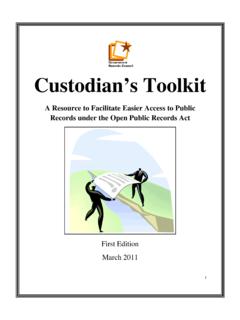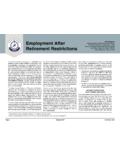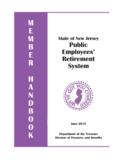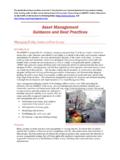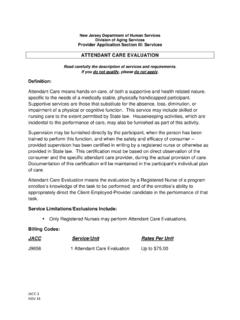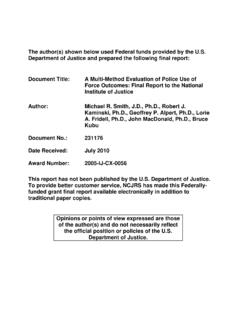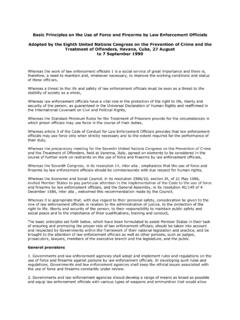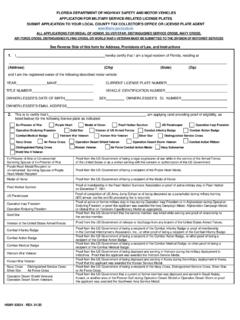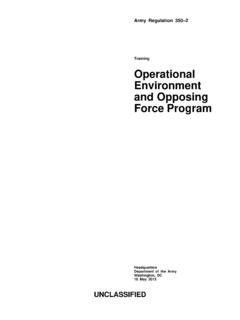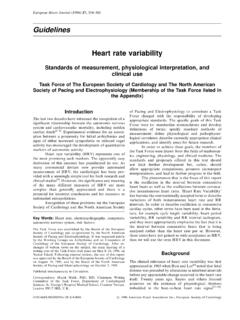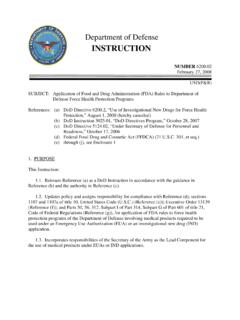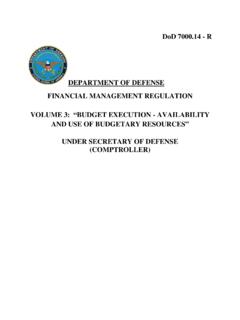Transcription of USE OF FORCE - Government of New Jersey
1 (6/00)USE OF FORCEA ttorney General's Use of FORCE PolicyIssued April 1985 Revised June 2000 PrefaceThe provisions of this revised policy are a product of the collective efforts andjudgment of the New Jersey Use of FORCE Advisory Committee. Throughout thedeliberation process, each member of the committee worked conscientiously to reach aconsensus in this area of critical importance to law enforcement officers and thecitizens of this state. The New Jersey Use of FORCE Advisory Committee realized thatthe law alone could not achieve the goal of properly guiding the use of FORCE by thepolice. The letter of the law needed to be supplemented with clear policy guidancedesigned to prepare officers to react appropriately when confronted with a use of law enforcement officers have been granted the extraordinary authority touse FORCE when necessary to accomplish lawful ends.
2 That authority is grounded in theresponsibility of every sworn law enforcement officer to comply with the laws of theState of New Jersey regarding the use of FORCE and to comply with the provisions of thispolicy. Equally important is law enforcement s obligation to prepare individual officers inthe best way possible to exercise that situations where law enforcement officers are justified in using FORCE , theutmost restraint should be exercised. The use of FORCE should never be consideredroutine. In determining to use FORCE , the law enforcement officer shall be guided by theprinciple that the degree of FORCE employed in any situation should be only thatreasonably necessary.
3 Law enforcement officers should exhaust all other reasonablemeans before resorting to the use of FORCE . It is the policy of the State of New Jerseythat law enforcement officers will use only that FORCE which is objectively reasonable policy reinforces the responsibility of law enforcement officers to take thosesteps possible to prevent or stop the illegal or inappropriate use of FORCE by otherofficers. Every law enforcement officer is expected and required to take appropriateaction in any situation where that officer is clearly convinced that another officer is usingforce in violation of state law.
4 Law enforcement officers are obligated to report allsituations in which FORCE is used illegally by anyone. This policy sends a clear messageto law enforcement officers that they share an obligation beyond the requirements ofAttorney General's Use of FORCE Policy(6/00)the law. Officers are encouraged to do whatever they can to interrupt the flow of eventsbefore a fellow officer does something illegal and before any official action is necessary. Law enforcement officers can serve each other and the public by simply saying or doingthe right thing to prevent a fellow officer from resorting to FORCE illegally whether to utilize FORCE when authorized in the conduct of officialresponsibilities is among the most critical decisions made by law enforcement officers.
5 It is a decision which can be irrevocable. It is a decision which must be made quicklyand under difficult, often unpredictable and unique circumstances. Sound judgmentand the appropriate exercise of discretion will always be the foundation of police officerdecisionmaking in the broad range of possible use of FORCE situations. It is not possibleto entirely replace judgment and discretion with detailed policy provisions. Nonetheless, this policy is intended to provide the best guidance and direction possibleto police officers throughout this state when called upon to confront and address themost difficult of situations.
6 Law enforcement officers whose actions are consistent withthe law and the provisions of this policy will be strongly supported by the lawenforcement community in any subsequent review of their conduct regarding the use offorce. authority does not involve actual physical contact withthe subject, but involves the use of the law enforcement officer sauthority to exert control over a include verbal commands, gestures, warnings, andunholstering a a firearm at a subject is an element of constructiveauthority to be used only in appropriate contact involves routine or procedural contact with asubject necessary to effectively accomplish a legitimate lawenforcement include guiding a subject into a police vehicle, holdingthe subject s arm while transporting.
7 Handcuffing a subject andmaneuvering or securing a subject for a General's Use of FORCE Policy(6/00) FORCE involves contact with a subject beyond that which isgenerally utilized to effect an arrest or other law enforcementobjective. Physical FORCE is employed when necessary to overcomea subject s physical resistance to the exertion of the lawenforcement officer s authority, or to protect persons or include wrestling a resisting subject to the ground, usingwrist locks or arm locks, striking with the hands or feet, or othersimilar methods of hand-to-hand FORCE involves the use of some device or substance,other than a firearm, to overcome a subject s resistance to theexertion of the law enforcement officer s include the use of a baton or other object, caninephysical contact with a subject.
8 Or chemical or natural FORCE is FORCE which a law enforcement officer uses with thepurpose of causing, or which the officer knows to create asubstantial risk of causing, death or serious bodily firing a firearm in the direction of another person or at avehicle, building or structure in which another person is believed tobe constitutes deadly threat to cause death or serious bodily harm, by the production ofa weapon or otherwise, so long as the officer s purpose is limited tocreating an apprehension that deadly FORCE will be used ifnecessary, does not constitute deadly belief is an objective assessment based upon anevaluation of how a reasonable law enforcement officer withcomparable training and experience would react to, or drawAttorney General's Use of FORCE Policy(6/00)inferences from, the facts and circumstances confronting andknown by the law enforcement officer at the danger describes threatened actions or outcomes thatmay occur during an encounter absent action by the lawenforcement officer.
9 The period of time involved is dependent onthe circumstances and facts evident in each situation and is not thesame in all threatened harm does not have to be instantaneous, forexample, imminent danger may be present even if a subject is notat that instant pointing a weapon at the law enforcement officer, butis carrying a weapon and running for discharge of a firearm entails some risk of an unintendedoutcome. A substantial risk exists when a law enforcement officerdisregards a foreseeable likelihood that innocent persons will example, firing a weapon into a confined space (room, vehicle,etc.)
10 Occupied by innocent persons exposes those persons to asubstantial risk of Enforcement person sworn to enforce the criminal laws of the State of NewJersey, who is certified by the Police Training Commission, or iscurrently employed by a public safety agency and is authorized tocarry a firearm under 2 and of law enforcement officer may use physical FORCE or mechanicalforce when the officer reasonably believes it is immediatelynecessary at the time:Attorney General's Use of FORCE Policy(6/00) overcome resistance directed at the officer or others; protect the officer, or a third party, from unlawful FORCE ; protect property; effect other lawful objectives, such as to make an of Deadly FORCE law enforcement officer may use deadly FORCE when the officerreasonably believes such action is immediately necessary toprotect the officer or another person from imminent danger of deathor serious bodily law enforcement officer may use deadly FORCE to prevent theescape of a fleeing suspect the officer has probable cause to believe hascommitted an offense in which the suspect caused orattempted to cause death or serious bodily harm.
